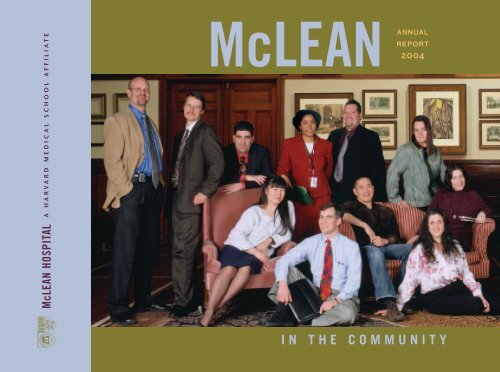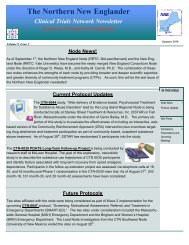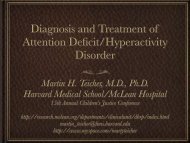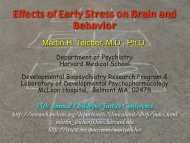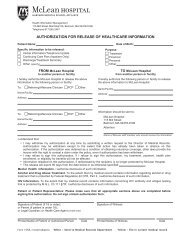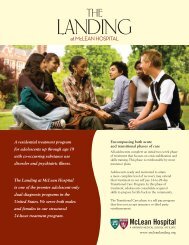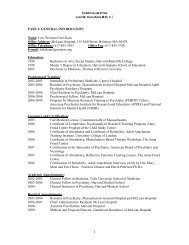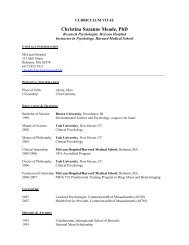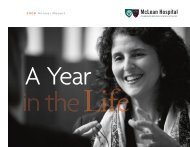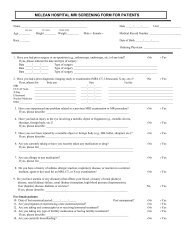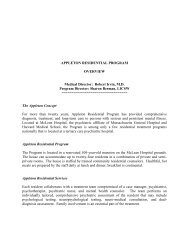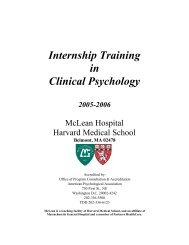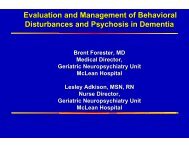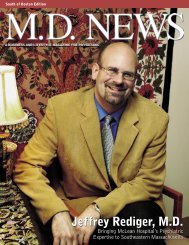PDF (1.9 MB) - McLean Hospital
PDF (1.9 MB) - McLean Hospital
PDF (1.9 MB) - McLean Hospital
Create successful ePaper yourself
Turn your PDF publications into a flip-book with our unique Google optimized e-Paper software.
A HARV ARD MEDICAL SCHOOL AFFILIATE<br />
McLEAN<br />
ANNUAL<br />
REPORT<br />
2004<br />
McLEAN HOSPITAL<br />
IN THE COMMUNITY
Members of this group represent staff from the diverse programs that make up the <strong>McLean</strong><br />
community—from Belmont to Boston, from Ashburnham in North Central Massachusetts,<br />
and to Brockton in the southeastern part of the state.
TRUSTEES<br />
KATHLEEN F. FELDSTEIN, PHD, Chairman<br />
DAVID S. BARLOW<br />
BRUCE M. COHEN, MD, PHD<br />
FERDINAND COLLOREDO-MANSFELD<br />
EDITH L. DABNEY<br />
GARY L. GOTTLIEB, MD, <strong>MB</strong>A<br />
EDWARD P. LAWRENCE, ESQ.<br />
KENNETH R. ROSSANO<br />
EDWARD M. SCOLNICK, MD<br />
GEORGE E. THIBAULT, MD<br />
ROSE-MARIE VAN OTTERLOO<br />
HONORARY TRUSTEES<br />
CHARLES D. BAKER<br />
BETTY BRUDNICK<br />
FRANCIS H. BURR, ESQ.<br />
G. LAMAR CRITTENDEN<br />
JOHN A. KANEB<br />
GEORGE PUTNAM<br />
W. NICHOLAS THORNDIKE
McLEAN<br />
Branches Out<br />
#
Dear Friends:<br />
For more than 100 years, <strong>McLean</strong> <strong>Hospital</strong> has been serving the community from a beautiful and sprawling<br />
college-like campus perched atop Belmont Hill. While Belmont continues to be the center of our clinical, academic<br />
and research work, the hospital, in recent years, has expanded its reach throughout Massachusetts and beyond.<br />
In this annual report for 2004, we focus on <strong>McLean</strong>’s growing involvement in the community. As you read this report,<br />
you will learn about many programs beyond the boundaries of the hospital on the hill, beginning with <strong>McLean</strong><br />
SouthEast, established to serve those in the fastest growing part of Massachusetts. Traveling west to <strong>McLean</strong> at<br />
Naukeag, you will see one of the country's premier dual-diagnosis treatment programs. And circling back to Boston,<br />
the Franciscan <strong>Hospital</strong> for Children is the home of a unique collaboration with <strong>McLean</strong> that is making a critical<br />
difference in the lives of children with behavioral, medical and developmental challenges. Through programs like<br />
these, <strong>McLean</strong> continues to increase the number of patients and families we help.<br />
Funding for psychiatric care remains inadequate to the need, but in 2004, after more than a decade of change, <strong>McLean</strong><br />
enjoyed a strong financial performance, posting gains on both the operating and bottom lines—the first time this has<br />
been achieved since 1991. Contributing to this success was our work with Partners HealthCare on many fronts; in<br />
particular, on quality measures and in our efforts to negotiate fairer reimbursement rates from health insurers.<br />
Improved care depends on new knowledge and <strong>McLean</strong> enjoyed another record year of funding for research,<br />
directing more than $46 million to basic and clinical studies designed to enhance our understanding and treatment<br />
of psychiatric illness. Research cannot progress without a constant sharing of ideas and information, and we have<br />
begun an exciting collaborative scientific program in genetics with colleagues from Harvard, M.I.T., the Broad<br />
Institute and the Whitehead Institute. We are also leading a network of four clinical trial sites throughout New<br />
England and a partnership between academic researchers and clinical treatment programs to evaluate new therapies<br />
for substance abuse. Both initiatives are highlighted in this report.<br />
Our training programs enjoyed a number of recent notable achievements: Our psychology internship program was<br />
awarded the maximal seven-year accreditation and glowing commentary by surveyors from the American<br />
Psychological Association. Our continuing medical education program grew and attracted broader audiences. Our<br />
three-day workshop, Psychiatry 2004, co-sponsored by Harvard Medical School, drew its largest attendance to date.<br />
We welcomed the first group of psychiatry residents into our new four-year program that places residents in<br />
hospitals across the Partners system.<br />
Making all of these achievements possible are the dedicated employees and staff of <strong>McLean</strong>, as well as members of<br />
our extended community—most notably, our patients, their families and friends, and our donors who so generously<br />
support our mission of providing exceptional, compassionate care, conducting novel basic and clinical research and<br />
training the best qualified mental health professionals. It is a privilege to be associated with this fine institution.<br />
As we confront the challenges that inevitably lie ahead, we take this opportunity to recommit ourselves to meeting<br />
the needs of all those we serve.<br />
Sincerely,<br />
Kathleen F. Feldstein, PhD<br />
Chairman of the Board<br />
Bruce M. Cohen, MD, PhD<br />
President and Psychiatrist in Chief
BRANCHING OUT<br />
Expansion<br />
by Design<br />
<strong>McLean</strong>’s strategic linkages within the community have been designed<br />
to simplify access to care in a health delivery system that is anything<br />
but easy for people to use, says Philip Levendusky, PhD, vice president<br />
of Network Development. “It made sense for us to take our services to<br />
people who could not travel to Belmont and to establish programs in<br />
areas that are either underserved or have a high potential for growth.”<br />
The economic realities of nearly a decade ago, along with the realization<br />
that <strong>McLean</strong> could operate programs beyond the boundaries of its<br />
Belmont campus, helped drive the hospital’s expansion into various<br />
communities throughout eastern Massachusetts. “We wanted to find<br />
venues and partnerships that bring the highest quality services to meet<br />
the needs of new patients and are economically viable in a time of<br />
reduced funding for psychiatric care.”<br />
McLEAN<br />
Heads SouthEast<br />
BROCKTON, MASS.<br />
Levendusky points out, “The programs we provide in the community<br />
and the individuals who staff them, are of the highest caliber. Patients<br />
at <strong>McLean</strong> SouthEast or patients at <strong>McLean</strong> at Naukeag, for example,<br />
receive the exact same level of care they would if they were in<br />
Belmont. That’s a point of pride and extremely important to us.”<br />
4
Forty miles southeast of the picturesque<br />
Boston skyline, <strong>McLean</strong> <strong>Hospital</strong> has<br />
taken up residence in the fastest<br />
growing part of the state, where mental health<br />
services are in great demand, yet in scarce<br />
supply. “We’re working to change that,” says<br />
Richard Curcuru, LICSW, program director for<br />
<strong>McLean</strong> SouthEast, a 25-bed adult inpatient unit<br />
and partial hospital program in Brockton, Mass.<br />
In February 2004, with approval from the<br />
Massachusetts Departments of Mental Health<br />
and Public Health, <strong>McLean</strong> SouthEast opened<br />
in newly refurbished quarters on the grounds of<br />
the Department of Veterans Affairs Boston<br />
Healthcare System (also known as the Brockton<br />
VA). Less than two months later, <strong>McLean</strong><br />
completed renovations on an adjacent 20-bed<br />
adolescent residential unit.<br />
Both units are now bustling treatment<br />
centers where lives are put back together.<br />
“Knowing that we are providing this level<br />
of care to an area with limited access to<br />
treatment is very gratifying,” says Curcuru,<br />
who helped oversee last year’s relocation and<br />
expansion of <strong>McLean</strong> SouthEast from a<br />
15-bed facility in Plymouth to its current site.<br />
“There is no question in my mind as to the<br />
critical role we play. Our beds are always full.”<br />
The 65-member staff of psychiatrists, social<br />
workers, nurses, counselors and a<br />
rehabilitation therapist diagnose and treat the<br />
full spectrum of psychiatric disorders. These<br />
include mood and thought disorders,<br />
psychotic disorders and substance abuse.<br />
While <strong>McLean</strong> SouthEast patients receive the<br />
same quality care as those in Belmont, medical<br />
director Jeffrey Rediger, MD, MDiv, says the<br />
staff possess a creative spark that is helping<br />
the program to develop its own identity. One<br />
example is a new sensory stimulation room<br />
created by staff, where patients are able to tap<br />
into their five senses—taste, touch, smell, sight<br />
and hearing—as an alternative way of coping<br />
with overwhelming feelings.<br />
Just outside the adult unit at <strong>McLean</strong><br />
SouthEast is the Adolescent Acute Residential<br />
Treatment (ART) Program. Here, teenagers,<br />
from 13 to 19, many of whom are discharged<br />
from inpatient hospitals, learn strategies that<br />
can help them avoid future hospitalizations.<br />
“We offer a very rich therapeutic environment,<br />
one that not only promotes the conventional<br />
treatment methods of therapy and medication,<br />
but emphasizes skills development and provides<br />
patients with ample opportunities to make<br />
personal decisions on how they choose to<br />
behave,” says Mark Picciotto, PhD, the program’s<br />
director. “It is dramatic to see how well our<br />
patients respond to treatment once they are<br />
ready to help themselves.”<br />
In the sensory stimulation room at <strong>McLean</strong> SouthEast, patients tap<br />
into their five senses as an alternative<br />
way of coping with overwhelming feelings.<br />
5
“You have held my hand while<br />
I learned how to walk again<br />
and as I continue to walk on<br />
my own, I am able to see that<br />
I am not alone.”<br />
~ A grateful patient<br />
6
BRANCHING OUT<br />
Nestled within a small North Central<br />
Massachusetts town, in a quaint<br />
lodge by a lake, lies <strong>McLean</strong> at<br />
Naukeag. Although it sits in the heart of rural<br />
Ashburnham, Mass., some 60 miles from<br />
Boston’s medical mecca, the facility is fast<br />
gaining ground as one of the top dualdiagnosis<br />
treatment programs in the country.<br />
“It’s been a very busy, very gratifying year,”<br />
says William Krauss, LMHC, LCSW, program<br />
director. “One of the keys to our success is that<br />
the staff truly enjoy the work they do. They find<br />
a definite reward in helping people.”<br />
Since it opened six years ago alongside the<br />
tranquil waters of Lake Naukeag, the program<br />
has built a strong base of patients whose<br />
substance abuse is complicated by psychiatric<br />
illness. The program offers two levels of care:<br />
A 26-bed residence serves individuals who have<br />
undergone detoxification and require 24-hour<br />
treatment, but in a less-restrictive environment<br />
than an inpatient unit offers. A partial<br />
hospital component addresses the needs of<br />
those who are able to participate in treatment<br />
during the day and then return home in the<br />
evening to practice their new skills.<br />
From the moment patients begin treatment<br />
each morning, their days are structured around<br />
thought-provoking meetings, self-help groups<br />
and creative workshops assembled by a staff of<br />
highly trained and experienced professionals.<br />
Clinical Coordinator Juanita Carter, RN,<br />
(left) offers holistic therapy sessions. “I try<br />
to teach patients alternative ways to care<br />
for themselves.”<br />
Holistic therapy is only one small part of a<br />
larger, comprehensive treatment approach<br />
taken by program staff, which includes the use<br />
of such traditional methods as psychotherapy,<br />
medication management and psychosocial<br />
skills groups. What really sets <strong>McLean</strong> at<br />
Naukeag apart is the relational approach to<br />
treatment and therapy, says clinical team<br />
manager Ray Levesque, MSW, LICSW.<br />
“We treat people with respect and develop a<br />
connection with them. Finding what’s human<br />
in these relationships, finding someone’s<br />
heart, is why I do this work. There’s also an<br />
excitement when you see people begin to come<br />
alive after they have been virtually dead from<br />
either chemicals or depression.”<br />
A large binder bursting with letters from<br />
appreciative patients says it best. One letter is<br />
written around the bold-print words, “Thank<br />
you. Thank you. Thank you.” It reads, “You have<br />
held my hand while I learned how to walk again<br />
and as I continue to walk on my own, I am able<br />
to see that I am not alone.” Another writes,<br />
“We all deserve a second chance at life. I will<br />
never forget you.”<br />
McLEAN<br />
at Naukeag<br />
ASHBURNHAM, MASS.<br />
7
BRANCHING OUT<br />
RESEARCH<br />
Out of the Lab and<br />
into the Community<br />
“This collaboration is allowing us to provide<br />
patients with the full benefit of the evolving<br />
science of addiction treatment, while allowing<br />
us, as researchers, to determine the most<br />
effective treatment approaches.”<br />
~ Roger Weiss, MD<br />
Thanks to a $7.7-million grant from the<br />
National Institute on Drug Abuse<br />
(NIDA), <strong>McLean</strong> is now taking its<br />
internationally recognized research program<br />
outside of the laboratory setting and into<br />
communities throughout New England.<br />
Roger Weiss, MD, clinical director of <strong>McLean</strong>’s<br />
Alcohol and Drug Abuse Treatment Center, is<br />
championing this effort, leading a network of<br />
four clinical trial sites throughout New<br />
England and a partnership between academic<br />
researchers and clinical treatment programs.<br />
The network, which is centered at <strong>McLean</strong>,<br />
enables researchers to design clinical trials<br />
based on real-life situations of people who<br />
enter drug treatment programs. The studies<br />
will determine the effectiveness of a variety<br />
of treatment approaches, including behavioral<br />
therapies, medications and a combination<br />
of the two.<br />
<strong>McLean</strong> researchers are conducting three<br />
studies in community-based treatment<br />
programs in Rhode Island, Massachusetts and<br />
Maine. The studies include the evaluation of a<br />
novel workshop approach to help drugdependent<br />
individuals seek and obtain employment;<br />
an examination of the effectiveness of<br />
the new medication buprenorphine in<br />
conjunction with drug counseling for opioiddependent<br />
adolescents; and a study of ways to<br />
improve the linkage between inpatient detoxification<br />
centers and after-care programs to<br />
ensure the likelihood of continuing care for<br />
patients. A new study looking at effective<br />
treatment options for prescription drug abuse<br />
is being developed and will be implemented in a<br />
community setting within the year.<br />
“This collaboration is allowing us to provide<br />
patients with the full benefit of the evolving<br />
science of addiction treatment, while allowing<br />
us, as researchers, to determine the most<br />
effective treatment approaches,” says Weiss.<br />
8
“Ideally, when all of these studies are<br />
completed in about two years, we will have a<br />
much better understanding of what works<br />
and what doesn’t. Ultimately, our work,<br />
combined with that of our colleagues from<br />
across the country, will lead to better, more<br />
effective treatments for drug abuse.”<br />
Mercy <strong>Hospital</strong> in Portland, Maine, is one of<br />
the study sites where research is currently<br />
being conducted. Burma Wilkins, RHIA,<br />
administrator of behavioral health at The<br />
Recovery Center at Mercy <strong>Hospital</strong>, says<br />
there are a number of benefits to the<br />
collaboration between research and<br />
community-based treatment programs.<br />
“Learning how to effectively treat this<br />
population will help reduce problems in a<br />
number of areas, including health-care costs,<br />
crime and the spread of communicable<br />
diseases,” notes Wilkins. “It allows us to<br />
bring the benefits of research into a realworld<br />
treatment center.”<br />
Unemployment is often a significant problem in drug-dependent individuals. At CAB Health & Recovery Services in Danvers, Mass.,<br />
clients learn job interviewing techniques and simple ways to search for employment.<br />
9
BRANCHING OUT<br />
MAKING<br />
INROADS<br />
The <strong>McLean</strong>-Franciscan<br />
Collaborative Approach to Care<br />
BOSTON, MASS.<br />
“You have to stop and really look<br />
at every little success, because<br />
in our business, the small<br />
successes are big—bigger than<br />
we realize.”<br />
~ Paul Pinnetti<br />
<strong>McLean</strong> not only reaches smaller<br />
underserved communities, it<br />
extends to the inner streets of<br />
Boston. As partners with the Franciscan<br />
<strong>Hospital</strong> for Children, a leader in pediatric<br />
medical and rehabilitation services, <strong>McLean</strong><br />
has built an effective center for addressing the<br />
complex needs of children with behavioral<br />
health, medical and developmental challenges.<br />
The <strong>McLean</strong>-Franciscan Child and Adolescent<br />
Mental Health Programs, located on the<br />
Franciscan <strong>Hospital</strong> grounds in Boston,<br />
“provides the kind of structure and support<br />
kids need to make their way back to the<br />
community,” says Ralph Buonopane, PhD.<br />
Buonopane oversees a 20-bed acute inpatient<br />
unit for young people, ages three to 19. The<br />
program also comprises a partial hospital and<br />
residential treatment service.<br />
In joining forces, <strong>McLean</strong> and Franciscan offer<br />
a depth and breadth of unparalleled resources:<br />
the exceptional care on which <strong>McLean</strong> has built<br />
its longstanding reputation as a leader in<br />
psychiatry and the unwavering commitment of<br />
Franciscan’s pediatric specialists and<br />
educators.<br />
Paul Pinnetti is a teacher with the program. He<br />
recalls one patient with attention deficit<br />
hyperactivity disorder (ADHD), who was<br />
repeatedly suspended from school. Pinnetti<br />
noticed that the student liked to draw so he<br />
taught him to doodle to curb his impulse to<br />
move (a common characteristic of ADHD),<br />
while listening to lectures in school.<br />
“I told him to make a contract with his teachers<br />
and say, ‘This is something I learned to do. I<br />
may doodle during lectures, but I will also be<br />
paying attention.’” A week after the student<br />
returned to school, his guidance counselor<br />
phoned Pinnetti to say the student was making<br />
it through each day without visiting the<br />
principal—a major milestone for the boy and a<br />
point of pride for Pinnetti.<br />
Down the hallway, on the same floor as<br />
Buonopane and Pinnetti, children attend<br />
classes at another <strong>McLean</strong>-Franciscan<br />
program where the objectives are different.<br />
The Kennedy Hope Academy is a year-round,<br />
14-bed residential school for children with a<br />
combination of autistic disorders, mental<br />
retardation and severe psychiatric illness.<br />
“We emphasize applied behavioral analysis as<br />
well as teaching social and academic skills.<br />
The goals we set for each child are<br />
individualized and range dramatically,” says<br />
Kennedy Hope Academy psychologist Marcia<br />
Conant, PhD. What remains constant, however,<br />
are the results: “We usually see change right<br />
away. One of the reasons for this, I believe, is<br />
that the kids feel comfortable—to learn, to<br />
make mistakes, to be who they are—in this<br />
environment.”<br />
Pinnetti agrees: Gazing at a<br />
drawing of a cougar that he<br />
received from his former<br />
fidgety student, Pinnetti says<br />
that helping kids, one step at a<br />
time, is what makes his job<br />
worthwhile. “You have to stop and really look<br />
at every little success, because in our<br />
business, the small successes are big—bigger<br />
than we realize.”<br />
11
BRANCHING OUT<br />
A COMMUNITY<br />
within a Community<br />
WAVERLEY PLACE<br />
BELMONT, MASS.<br />
Matthew Dong pulls a three-dollar<br />
bag of fruit off the produce<br />
counter. “Apples are nutritious and<br />
a dozen costs less than a small package of<br />
empty-calorie cookies. Why don’t you try them<br />
and see what you think?” he says to the person<br />
standing beside him.<br />
Dong (right) is an occupational therapist at<br />
<strong>McLean</strong>’s Waverley Place, a community<br />
rehabilitation program for adults with<br />
psychiatric illness, located in Waverley Square,<br />
Belmont. Although he has an office, he spends<br />
little time there. “Working directly in the<br />
community with our members, not just in a<br />
treatment setting, gives me an opportunity to<br />
help them make important changes.”<br />
Dong spends each day guiding members of<br />
Waverley Place through tasks of daily living,<br />
such as doing laundry or balancing a checkbook,<br />
often making small adjustments that have<br />
substantial benefits. A simple trip to the grocery<br />
store, for instance, can help members make the<br />
right nutritional choices, budget their money<br />
and interact socially with others. These tasks,<br />
while mundane to most people, may be incredibly<br />
daunting for people with psychiatric illness.<br />
“Many of our members get over-stimulated by<br />
the grocery store environment and avoid going<br />
at all. So we’ll strategize about what we can do<br />
to make the experience less overwhelming.<br />
What we usually decide is to go to a smaller<br />
market, go on off-peak hours or make a list, so<br />
they can spend less time there.”<br />
One Waverley Place member has reaped the<br />
benefits of Dong’s work. She has learned how<br />
to grocery shop more efficiently and has<br />
also saved cash by attending his money<br />
management workshop each Friday. By taking<br />
his suggestion to cut back on smoking, she<br />
now has money left over in her monthly budget<br />
and it has given her the incentive to stop<br />
smoking altogether.<br />
Dong is always looking for ways to empower<br />
members. He helped one person begin an<br />
exercise program by walking together around<br />
a nearby pond. He inspired others to make and<br />
sell greeting cards.<br />
Members of Waverley Place, like Amy Parkhurst<br />
(right), the greeting card entrepreneur, are<br />
grateful to Matthew. “I’ve sold 64 of my cards<br />
so far, thanks, in part, to Matthew. He has given<br />
me the confidence to reach my goals,” she says.<br />
Dong says he feels like the fortunate one.<br />
“Most days, I go home, saying, ‘I’ve made a<br />
difference in a person’s life.’ That’s enormously<br />
gratifying to me.”<br />
12
“Most days, I go home, saying,<br />
‘I’ve made a difference in a person’s life.’<br />
That’s enormously gratifying to me.”<br />
~ Matthew Dong<br />
13
PARTNERSHIPS<br />
at Work<br />
ARMING POLICE WITH<br />
SPECIAL KNOW-HOW<br />
Police receive a call from a teenager who says<br />
his grandfather has a gun and is afraid he<br />
might hurt himself. What does the responding<br />
officer do once he enters the home and finds<br />
the elderly man holding a pistol? This is the<br />
kind of scenario being played out during a joint<br />
<strong>McLean</strong> <strong>Hospital</strong> and Massachusetts<br />
Department of Mental Health training session<br />
at the State Police Academy in Plymouth, Mass.<br />
<strong>McLean</strong> Provider Relations Manager, Richard<br />
Silva, helped launch the course, which consists<br />
of a mental health informational session and a<br />
role-playing session to furnish police officers<br />
with a better understanding of how to manage<br />
mentally ill individuals during crises. “Our goal<br />
is to help the police avoid having to make a<br />
choice whether or not to use violence. Our hope<br />
is to save lives.” The course has been well<br />
received, Silva reports. “We have had many<br />
officers request a second session.”<br />
TREATMENT OUTCOME’S<br />
LATEST TOOL<br />
Health-care facilities, like any other consumerdriven<br />
service, continually strive to ensure<br />
positive outcomes of care. BASIS-24, <strong>McLean</strong>’s<br />
latest outcomes measurement tool, allows<br />
psychiatric and behavioral health providers to<br />
evaluate changes in their patients’ self-reported<br />
symptoms and feelings. Patients complete the<br />
survey upon admission and at discharge. The<br />
results help hospitals determine whether<br />
patients’ outcomes of care are in line with<br />
expectations.<br />
Alex Speredelozzi, <strong>MB</strong>A, manager of Mental<br />
Health Services Evaluation for <strong>McLean</strong><br />
<strong>Hospital</strong>, oversees the licensing and use of<br />
BASIS-24. “The survey,” he says, “is succinct,<br />
easy to read and backed by extensive fieldtesting<br />
for reliability and validity. For patients,<br />
that means a better way of having their<br />
perspectives counted; for hospitals, that means<br />
a more effective way to assess treatment<br />
outcomes and foster patient-centered care.”<br />
RALLY students at the Curley Middle School<br />
in Jamaica Plain, Mass.<br />
RALLY = AN OUNCE OF<br />
PREVENTION<br />
“How are you doing today?” It’s a<br />
simple question, but when asked of a<br />
troubled youngster, it may have lifechanging<br />
effects. RALLY (Responsive<br />
Advocacy for Life and Learning in<br />
Youth), a program that asks this sort<br />
of query, is an innovative model of<br />
educational and mental health early<br />
intervention being implemented at<br />
public schools and after-school sites<br />
around the country. Created by<br />
<strong>McLean</strong> and the Harvard Graduate<br />
School of Education (HGSE), the<br />
program seeks to develop more<br />
successful and resilient youth by identifying atrisk<br />
students, helping children thrive in school<br />
and offering the support and strong adult<br />
relationships all adolescents need.<br />
During any given day, “prevention practitioners,”<br />
HGSE students, might work in a classroom with<br />
struggling students, meet with a teacher to<br />
develop a tutoring strategy, call a parent to<br />
discuss a troubled youth and run a boys’ group<br />
to help students deal with aggression.<br />
RALLY’s hands-on approach continues to earn<br />
high marks. “New evaluation data shows the<br />
academic gains are quite strong compared to<br />
classrooms without RALLY,” says the program’s<br />
founder, <strong>McLean</strong> staff member, Gil Noam, EdD,<br />
PhD. “Having people with a knowledge base in<br />
mental health helps calms the waters and allows<br />
teachers to teach.”<br />
14
BRANCHING OUT<br />
PAGING MCLEAN TO THE ER<br />
<strong>McLean</strong>’s involvement in the community<br />
expands beyond its own doors into the<br />
emergency rooms (ERs) at two eastern<br />
Massachusetts hospitals. <strong>McLean</strong> clinicians<br />
are now providing behavioral health back-up<br />
coverage at Jordan <strong>Hospital</strong> in Plymouth and at<br />
Winchester <strong>Hospital</strong>. This year, <strong>McLean</strong> will<br />
expand its contract with Jordan by adding a<br />
physician-based consultation and liaison<br />
service to that hospital’s inpatient units.<br />
With increasing numbers of people relying on<br />
ERs for their care, the arrangement with<br />
<strong>McLean</strong> is beneficial both to patients and<br />
hospitals, says Carol Dilliplane, vice president<br />
for Patient Care Services at Jordan <strong>Hospital</strong>.<br />
“Patients receive immediate access to<br />
clinicians who have the skills necessary to<br />
place them in appropriate treatment settings,<br />
which is usually not in an emergency<br />
department,” she says. “We value our<br />
relationship with <strong>McLean</strong> very much and hope<br />
it will continue.”<br />
RESEARCH COLLABORATIONS EXPLORE CAUSES, CURES<br />
<strong>McLean</strong> recently joined forces with the new Eli and Edythe L. Broad Institute, a collaboration<br />
of investigators from Harvard, the Harvard hospitals, M.I.T., and the Whitehead Institute for<br />
Biomedical Research, designed to realize the promise of the human genome for medicine. According<br />
to Eric Lander, PhD, founding director of the Broad Institute and a leader of the Human Genome<br />
Project, genetic mapping could have a huge effect on understanding psychiatric illnesses because<br />
“these are diseases of the whole human body and have to be studied as such; this is where being able<br />
to study all variations of the human genome really matters.”<br />
<strong>McLean</strong> investigators, including a team led by Stephan Heckers, MD, MSc, director of the<br />
Schizophrenia and Bipolar Disorder Program, will collaborate with Broad investigators in using<br />
cutting-edge genome technologies to isolate genes related to psychotic and bipolar symptoms in<br />
human subjects. The scientists hope to understand which genes, alone or in combination, may lead to<br />
bipolar disorder and schizophrenia. In collaboration with Uwe Rudolph, MD, director of <strong>McLean</strong>’s new<br />
Transgenic Research Laboratory, they will then determine what these genes do and use that<br />
information to design better treatments for psychiatric disorders.<br />
Says Bruce Cohen, MD, PhD, president and psychiatrist in chief for <strong>McLean</strong>: “Modern medical<br />
research takes a community of partnerships among investigators, people and institutions from many<br />
different fields. When you put all of these together, you get synergies and progress greater than<br />
individuals can produce working alone.”<br />
“Modern medical research takes a community of partnerships among<br />
investigators, people and institutions from many different fields.<br />
When you put all of these together, you get synergies and progress<br />
greater than individuals can produce working alone.”<br />
~ Bruce Cohen, MD, PhD<br />
15
ACHIEVEMENTS<br />
of the Year<br />
A NEW FACE IN CYBERSPACE<br />
<strong>McLean</strong> debuted its newly designed web site in 2004 (www.mclean.harvard.edu), providing<br />
significantly improved navigation and expanded menu options. Containing close to 1,000 pages of<br />
information, the site features a clinical and research staff directory, an enhanced search function,<br />
video news clips and a virtual tour that enables people from remote corners of the globe to “visit”<br />
<strong>McLean</strong> without leaving their homes or offices.<br />
The site has helped new patients find <strong>McLean</strong>’s door, including one woman who said she chose the<br />
hospital in part because the web site not only presented a clear description of the treatment<br />
program she was seeking, it also conveyed a nice sense of the <strong>McLean</strong> community. “Our web site has<br />
given us a new way to reach hundreds of thousands of people in need of quality mental health care<br />
and information. We’re proud of that and continue to look for more diverse and dynamic<br />
components to add to the site,” says Nancy Still, MPH, director of Network Development, who heads<br />
up the hospital’s web committee.<br />
STAYING CONNECTED<br />
<strong>McLean</strong>’s reputation as a world-renowned psychiatric facility<br />
has been bolstered with the establishment of three hospitalsponsored<br />
groups: the <strong>McLean</strong> <strong>Hospital</strong> International<br />
Psychiatric Society, the <strong>McLean</strong> Residency Alumni Association<br />
and the Irene Pierce Stiver Psychology Alumni Association.<br />
With a combined membership of 500 active graduates,<br />
<strong>McLean</strong>’s psychiatry and psychology alumni associations offer<br />
a number of benefits to their members, including preferred<br />
access to <strong>McLean</strong> services, newsletter and email updates on<br />
current happenings at <strong>McLean</strong> and the opportunity to network<br />
professionally with colleagues from across the country, says<br />
Frank Ghinassi, PhD, Class of 1989, chief of adult services at<br />
the Western Psychiatric Institute and Clinic in Pittsburgh. An<br />
added bonus, says Justin Richardson, MD, Class of 1994,<br />
assistant clinical professor of psychiatry at Columbia<br />
University College of Physicians and Surgeons, is the<br />
rekindling of friendships. “For those of us who have left the<br />
nest, an alumni association is a great way to maintain the<br />
strong connections we have made with our friends and teachers<br />
at <strong>McLean</strong>.”<br />
Dr. Harry Baker’s affiliation with <strong>McLean</strong> began well over five<br />
years ago. <strong>McLean</strong> and <strong>Hospital</strong> Medica Sur in Mexico City,<br />
where he is a physician, have sponsored more than 20<br />
conferences, trained more than 15 physicians and spearheaded<br />
promising clinical and research initiatives. It was only fitting<br />
then, that he be one of the founding members of the newly<br />
formed <strong>McLean</strong> International Psychiatric Society. “Sharing<br />
knowledge is a way of diminishing distance in the world, which<br />
is now more necessary than ever,” says Baker. “Can you imagine<br />
what would happen if this is multiplied by many cities and<br />
countries around the world?”<br />
16
BRANCHING OUT<br />
VISION OF EXCELLENCE AWARD RECIPIENTS<br />
<strong>McLean</strong> <strong>Hospital</strong>’s Vision of Excellence Award is an opportunity for the<br />
hospital community to show its appreciation for employees who<br />
contribute to the overall excellence of <strong>McLean</strong>. The six individuals<br />
selected in 2004 exemplify <strong>McLean</strong>’s commitment to superior patient<br />
care, research and teaching.<br />
Fran Nestor, Biological Psychiatry Laboratory<br />
December 2003/January 2004<br />
Janice Aucoin, Nursing Administration<br />
February/March 2004<br />
Patrick Kekeke, Nursing<br />
April/May 2004<br />
Denise Mannix, Medical Records<br />
June/July 2004<br />
Joan Gillis, MSW, Geriatric Psychiatry<br />
August/September 2004<br />
Noemi Ottowitz, Development Office<br />
October/November 2004<br />
HONORS AND ACCOLADES<br />
Francine M. Benes, MD, PhD, director of the<br />
Program in Structural and Molecular<br />
Neuroscience and director of the Harvard<br />
Brain Tissue Resource Center at <strong>McLean</strong>, was<br />
elected a member of the Institute of Medicine<br />
(IOM) of the National Academy of Sciences.<br />
Benes’ many scientific discoveries, which<br />
include identifying a “miswiring” of fibers in<br />
the brain’s circuitry system that is involved in<br />
schizophrenia and bipolar disorder, have<br />
opened up new areas of research that could<br />
lead to improved treatment and prevention<br />
strategies for these disorders.<br />
William Carlezon, PhD, director of the<br />
Behavioral Genetics Laboratory, was an<br />
honored guest at a White House ceremony<br />
where he received the Presidential Early<br />
Career Award for Scientists and Engineers.<br />
The award, by the National Science and<br />
Technology Council, recognizes “…the finest<br />
scientists and engineers who…show<br />
exceptional potential for leadership at the<br />
frontiers of scientific knowledge.” Carlezon<br />
specializes in research that establishes causal<br />
relationships between brain biochemistry and<br />
behavior, specifically focusing on depression,<br />
bipolar disorder and addiction.<br />
Joseph Coyle, MD, director of the Laboratory<br />
of Psychiatric and Molecular Neuroscience,<br />
was awarded the Constance Lieber Prize for<br />
Outstanding Achievement in Schizophrenia<br />
Research by the National Alliance for<br />
Research on Schizophrenia and Depression.<br />
The Lieber Prize is bestowed on a research<br />
scientist who has made distinguished<br />
contributions to the understanding of<br />
schizophrenia. Coyle also was elected as a<br />
fellow by the American Association for the<br />
Advancement of Science (AAAS). This honor<br />
recognizes his many achievements in<br />
research and his international service to<br />
the scientific community.<br />
Michele L. Gougeon, executive vice<br />
president and chief operating officer for<br />
<strong>McLean</strong>, was elected to a three-year term<br />
on the Board of Directors of the Watertown-<br />
Belmont Chamber of Commerce, which began<br />
in January 2004.<br />
17
M CLEAN HOSPITAL<br />
2004 AND 2003 STATEMENT OF OPERATIONS<br />
Revenues 2004 2003<br />
Net patient service revenue 69,342 $62,064<br />
Research revenue 42,601 39,445<br />
Other 10,115 8,007<br />
Total operating revenue $ 122,058 $ 109,516<br />
Expenses<br />
Compensation and benefits $ 56,298 $ 50,454<br />
Supplies and other expenses 23,160 22,705<br />
Direct research cost 31,769 29,196<br />
Depreciation 6,061 6,152<br />
Provision for bad debts 2,508 1,394<br />
Interest 1,163 1,234<br />
Total operating expenses $ 120,959 $ 111,135<br />
Gain/loss from operations $ 1,099 $ (1,619)<br />
Nonoperating and noncurrent income 52 (1,711)<br />
Excess of revenues over expenses $ 1,151 $ (3,330)<br />
Other changes in net assets<br />
Change in net unrealized gains on investments $ 1,752 $ 3,932<br />
Funds utilized for property and equipment 1,201 800<br />
Transfers (to) from affiliates, net (25) 819<br />
Increase in unrestricted net assets $ 4,079 $ 2,221<br />
18<br />
FACTS AND FIGURES 2004<br />
Staff (FTEs)<br />
Physicians and Psychologists: 84<br />
Residents: 26<br />
Psychology Trainees: 15<br />
Nurses: 138<br />
Clinical Social Workers (MSWs): 78<br />
Mental Health/Community<br />
Residence Specialists: 223<br />
Other: 271<br />
Employees Supported by<br />
Research and Special Funds: 330<br />
TOTAL (FTEs): 1165
FINANCIALS<br />
2004 AND 2003 BALANCE SHEET<br />
Current assets 2004 2003<br />
Cash and investments $ 14,212 $ 11,908<br />
Current portion of investments limited as to use 9,157 14,571<br />
Patient accounts receivable 7,321 6,161<br />
Other current assets 3,764 4,386<br />
Total current assets 34,454 37,026<br />
Long-term investments and investments limited as to use 21,259 16,074<br />
Interest in the net assets of The Massachusetts General <strong>Hospital</strong> 49,773 44,303<br />
Property and other long-term assets 55,994 59,537<br />
Total assets $ 161,480 $ 156,940<br />
Current Liabilities<br />
Accounts payable and accrued expenses $ 15,464 $ 17,649<br />
Accrued compensations and benefits 5,871 5,442<br />
Total current liabilities $ 21,335 $ 23,091<br />
Other long-term liabilities $ 9,395 $ 8,009<br />
Long-term debt, less current portion $ 23,683 $ 25,810<br />
Total liabilities $ 54,413 $ 56,910<br />
Net assets<br />
Unrestricted $ 47,141 $ 43,062<br />
Temporarily restricted 33,683 31,152<br />
Permanently restricted 26,243 25,816<br />
Total net assets 107,067 100,030<br />
Total liabilities and net assets $ 161,480 $ 156,940<br />
Average Beds in Service:<br />
167<br />
Inpatient Days:<br />
53,418<br />
Partial <strong>Hospital</strong> Visits:<br />
225,170<br />
Residential Days:<br />
16,426<br />
Admissions:<br />
5,078<br />
Partial <strong>Hospital</strong> Days:<br />
68,060<br />
Outpatient Visits:<br />
58,047<br />
Night Care:<br />
21,740<br />
19
“We believe that if enough concerned individuals get involved to support <strong>McLean</strong>, research<br />
can go further, treatments will become better and education will help advance the latest knowledge<br />
on improving the lives of those affected by psychiatric illness.”<br />
~ Jeanne Robertson<br />
M CLEAN NATIONAL COUNCIL:<br />
WORKING TOGETHER FOR<br />
A COMMON CAUSE<br />
20
BRANCHING OUT<br />
Astrong recommendation from a<br />
trusted source can make a<br />
significant difference when<br />
pondering a critical decision, such as where<br />
to go for health care or which charitable<br />
organization to support. Members of<br />
<strong>McLean</strong> <strong>Hospital</strong>’s National Council,<br />
established in 2002 and comprised of 35<br />
influential business, civic and academic<br />
leaders, serve as that trusted source within<br />
their individual communities, in business,<br />
government and the media.<br />
With a mission to promote <strong>McLean</strong>’s<br />
reputation and increase its base of support<br />
nationwide, the National Council makes an<br />
important contribution to <strong>McLean</strong>. Council<br />
members help mobilize people and resources<br />
to strengthen the hospital’s service to<br />
individuals with psychiatric illness.<br />
“We believe that if enough concerned<br />
individuals get involved to support <strong>McLean</strong>,<br />
research can go further, treatments will<br />
become better and education will help<br />
advance the latest knowledge on improving<br />
the lives of those affected by psychiatric<br />
illness,” explains National Council<br />
Chairperson Jeanne Robertson.<br />
Each fall, council members convene at<br />
<strong>McLean</strong> for a two-day summit, where they<br />
receive an insider’s look at the hospital’s<br />
latest research and clinical work. Armed<br />
with that knowledge, they act as<br />
ambassadors-at-large, advocating on behalf<br />
of <strong>McLean</strong> and mental health in general.<br />
National Council members lead by<br />
example, contributing nearly $1.5 million<br />
to support <strong>McLean</strong> programs and new<br />
initiatives in 2004, including two projects<br />
personally overseen by council members: a<br />
Patient Fitness and Social Recreation<br />
Center and an Adolescent Mental Health<br />
and Wellness Curriculum.<br />
Spearheaded by council member Kay<br />
Kimpton Walker, the Fitness and Social<br />
Recreation Center will provide a facility<br />
where <strong>McLean</strong> patients can get both regular<br />
physical exercise and engage socially with<br />
others to alleviate the isolation that is too<br />
often a consequence of psychiatric illness.<br />
Fellow council members Bob and Nancy<br />
Anthony saw a need to reach out to the<br />
community and initiated collaboration<br />
between <strong>McLean</strong> <strong>Hospital</strong> and Children’s<br />
<strong>Hospital</strong> Boston clinicians to create a<br />
curriculum that promotes wellness,<br />
facilitates resiliency and reduces stigma of<br />
mental illness among adolescents.<br />
<strong>McLean</strong>’s Chief Development Officer,<br />
Catharine Cook, is grateful for the<br />
enthusiastic support of the National Council.<br />
“The National Council has proven to be a<br />
dedicated group of individuals who, by<br />
directing their time, resources and energy to<br />
<strong>McLean</strong>, are helping create a better future<br />
for people affected by psychiatric illness,”<br />
she says. “Council members are superior<br />
allies who reinforce <strong>McLean</strong> and its work.”<br />
<strong>McLean</strong> is enormously appreciative<br />
of the generosity of its donors and offers<br />
a number of giving opportunities,<br />
including unrestricted gifts, restricted<br />
gifts, endowed funds, capital donations and<br />
naming opportunities. Other ways to<br />
support <strong>McLean</strong> include appreciated<br />
securities, real estate and charitable<br />
gift annuities.<br />
For additional information on making a<br />
gift to <strong>McLean</strong> or to inform the hospital of a<br />
bequest, call the Development Office at<br />
617.855.3415. Gifts may be made payable to<br />
<strong>McLean</strong> <strong>Hospital</strong> and mailed to: The<br />
<strong>McLean</strong> <strong>Hospital</strong> Development Office,<br />
115 Mill Street, Belmont, MA 02478-9106 or<br />
they may be made online at<br />
www.mclean.harvard.edu.<br />
21
ADMINISTRATION<br />
BRUCE M. COHEN, MD, PHD<br />
President and Psychiatrist in Chief<br />
PAUL J. BARREIRA, MD<br />
Chief, Community Clinical Services<br />
Director, Medical Education<br />
JAMES A. CHU, MD<br />
Chief, <strong>Hospital</strong> Clinical Services<br />
LINDA M. FLAHERTY, MSN, RN, CS<br />
Senior Vice President<br />
Patient Care Services<br />
MICHELE L. GOUGEON<br />
Executive Vice President<br />
Chief Operating Officer<br />
DAVID LAGASSE<br />
Senior Vice President<br />
Fiscal Affairs<br />
PHILIP G. LEVENDUSKY, PHD<br />
Vice President, Network Development<br />
Director, Psychology<br />
Director, Psychology Training<br />
PETER A. PASKEVICH<br />
Vice President<br />
Research Administration<br />
DIANE B. BEDELL, LICSW<br />
Director, Psychiatric Triage<br />
Director, Ambulatory Services<br />
EUGENE V. BERESIN, MD<br />
Training Director<br />
MGH/<strong>McLean</strong> Child and Adolescent Psychiatry<br />
Residency Training Program<br />
SARA M. BOLTON, MD<br />
Medical Director<br />
Clinical Evaluation Center<br />
CATHARINE A. COOK<br />
Chief Development Officer<br />
MARC A. DIFABBIO<br />
Director<br />
<strong>Hospital</strong> Information Systems<br />
JAMES M. ELLISON, MD<br />
Clinical Director<br />
Geriatric Psychiatry Program<br />
BRENT P. FORESTER, MD<br />
Medical Director<br />
Dementia Program<br />
STEVEN E. GELDA, MD<br />
Medical Director<br />
Short Term Unit<br />
ANDREW D. GILL, MD<br />
Medical Director<br />
<strong>McLean</strong> at Naukeag<br />
JOSEPH GOLD, MD<br />
Clinical Director<br />
Child and Adolescent Psychiatry Program<br />
JOHN G. GUNDERSON, MD<br />
Medical Director<br />
Borderline Personality Disorder Treatment Center<br />
ANDREW HEALY<br />
Director<br />
Facilities<br />
STEPHAN HECKERS, MD, MSC<br />
Director<br />
Schizophrenia and Bipolar Disorder Program<br />
MICHAEL A. JENIKE, MD<br />
Medical Director<br />
Obsessive Compulsive Disorders Institute<br />
SALLY H. JENKS<br />
Director, Managed Care and Business Development<br />
CYNTHIA L. LEPORE<br />
Director<br />
Public Affairs<br />
BRUCE H. PRICE, MD<br />
Director<br />
Neurology<br />
JEFFREY D. REDIGER, MD, MDIV<br />
Medical Director<br />
<strong>McLean</strong> SouthEast<br />
MARK A. ROBART, LICSW<br />
Director<br />
Partial <strong>Hospital</strong> and Residential Services<br />
STANLEY L. ROSEN, RPH<br />
Director, Pharmacy<br />
KATHY M. SANDERS, MD<br />
Training Director<br />
MGH/<strong>McLean</strong> Adult Psychiatry<br />
Residency Training Program<br />
KAREN J. SHEDLACK, MD<br />
Medical Director<br />
Adult Developmental Disabilities Program<br />
ARTHUR J. SIEGEL, MD<br />
Director<br />
Internal Medicine<br />
NANCY H. STILL<br />
Director, Network Development<br />
GRANTLEY W. TAYLOR, MD<br />
Medical Director<br />
Community Reintegration Unit<br />
ALEXANDER VUCKOVIC, MD<br />
Medical Director<br />
The Pavilion<br />
ROGER D. WEISS, MD<br />
Clinical Director<br />
Alcohol and Drug Abuse Treatment Program<br />
THOMAS WELENC<br />
Director<br />
Materials Management<br />
JOAN M. COTTLER, LICSW<br />
Director, Patient and Family Support Services<br />
Director, Social Work<br />
Director, Medical Records<br />
ESTHER DECHANT, MD<br />
Medical Director<br />
Klarman Eating Disorders Program<br />
EDMUND C. NEUHAUS, PHD<br />
Medical Director<br />
Behavioral Health Partial <strong>Hospital</strong> Program<br />
LISA D. PRATT<br />
Director<br />
Human Resources and <strong>Hospital</strong> Systems<br />
SHERRY WINTERNITZ, MD<br />
Clinical Director<br />
Trauma and Dissociative Disorders Program<br />
22
WHO’S WHO<br />
ON THE COVER<br />
Stephan Heckers, MD, MSc<br />
Director, Schizophrenia and<br />
Bipolar Disorder Program<br />
Richard Curcuru, LICSW<br />
Program Director,<br />
<strong>McLean</strong> SouthEast<br />
Laura Neves<br />
Associate, Public Affairs<br />
Richard Silva<br />
Provider Relations Manager,<br />
Network Development<br />
Marcia Conant, PhD<br />
Psychologist,<br />
Kennedy Hope Academy<br />
Paul Pinnetti<br />
Teacher, <strong>McLean</strong>-Franciscan<br />
Child and Adolescent<br />
Mental Health Programs<br />
William Krauss, LMHC, LCSW<br />
Program Director, <strong>McLean</strong> at Naukeag<br />
Alex Speredelozzi, <strong>MB</strong>A<br />
Manager, Mental Health<br />
Services Evaluation<br />
Jeffrey Rediger, MD, MDiv<br />
Medical Director,<br />
<strong>McLean</strong> SouthEast<br />
Nancy Still, MPH<br />
Director,<br />
Network Development<br />
Francine Benes, MD, PhD<br />
Director, Program in Structural<br />
and Molecular Neuroscience;<br />
Director, Harvard Brain Tissue<br />
Resource Center at <strong>McLean</strong>.<br />
Alice Bredice<br />
Administrative Coordinator,<br />
Harvard Brain Tissue<br />
Resource Center at <strong>McLean</strong><br />
Mark Picciotto, PhD<br />
Program Director, <strong>McLean</strong><br />
SouthEast Adolescent Acute<br />
Residential Treatment Program<br />
Matthew Dong<br />
Occupational Therapist,<br />
Waverley Place<br />
Juanita Carter, RN<br />
Clinical Coordinator,<br />
<strong>McLean</strong> at Naukeag<br />
Amy Parkhurst<br />
Member, Waverley Place<br />
Joan Kovach, RN, MS<br />
Nursing Director,<br />
<strong>McLean</strong> SouthEast<br />
Ralph Buonopane, PhD<br />
Program Director,<br />
<strong>McLean</strong>-Franciscan Child and Adolescent<br />
Mental Health Programs<br />
Ray Levesque<br />
MSW, LICSW<br />
Clinical Team Manager<br />
<strong>McLean</strong> at Naukeag<br />
Please write the Development Office at 115 Mill Street, Belmont, MA 02478,<br />
if you do not wish to receive future fundraising materials designed to support <strong>McLean</strong> <strong>Hospital</strong>.<br />
23
and a member of Partners HealthCare<br />
McLEAN HOSPITAL<br />
MCLEAN HOSPITAL<br />
115 Mill Street<br />
Belmont Massachusetts 02478<br />
ADDRESS SERVICE REQUESTED<br />
<strong>McLean</strong> <strong>Hospital</strong> is the largest psychiatric facility of Harvard<br />
Medical School, an affiliate of Massachusetts General <strong>Hospital</strong><br />
Compassionate Care Informed by Research<br />
NON-PROFIT ORG.<br />
US POSTAGE<br />
PAID<br />
BOSTON, MA<br />
PERMIT NO. 58168<br />
We’d like to hear from you. If you<br />
have comments or questions about<br />
<strong>McLean</strong> or would like further<br />
information on specific initiatives<br />
highlighted in this report, please<br />
call us at 617.855.2110 or email<br />
us at PA@mclean.harvard.edu<br />
www.mclean.harvard.edu<br />
©2005, <strong>McLean</strong> <strong>Hospital</strong> Managing Editor: Cynthia L. Lepore, Director of Public Affairs Writers: Cara Birritierri, Adriana M. Bobinchock Design: Cahoots Principal Photographer: Tanit Sakakini


